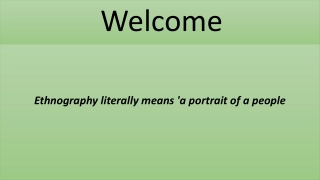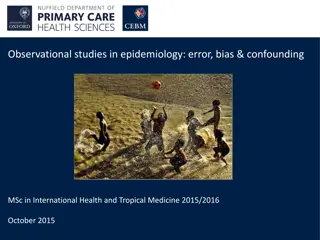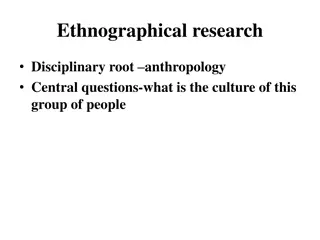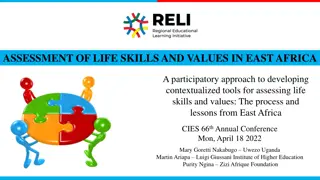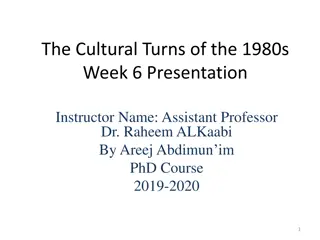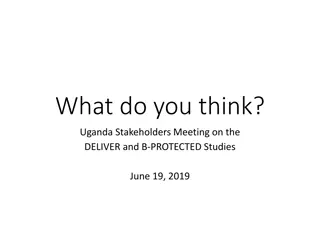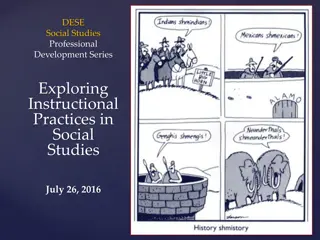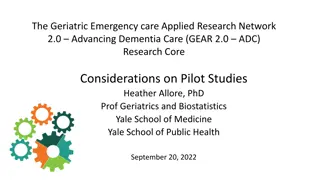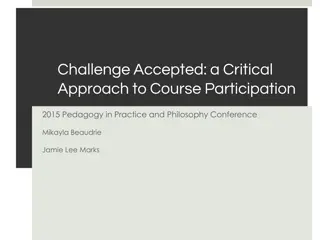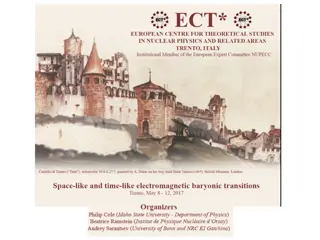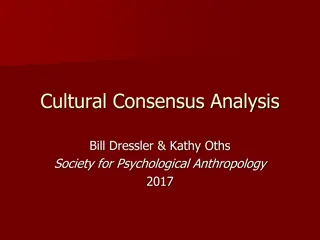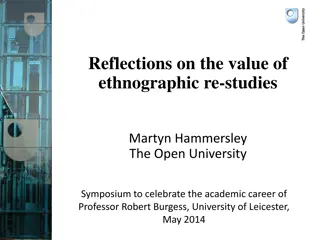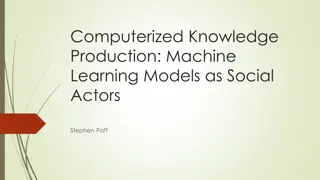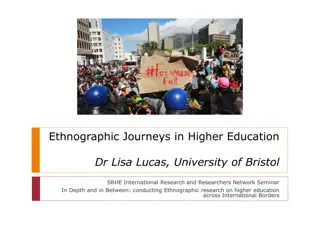Understanding Ethnographic Research Design
Ethnography, a qualitative research method, involves studying people and cultures through observation and interaction in their natural environment. Researchers immerse themselves in the subject group to gain insights, interpret results through a cultural lens, and document findings through detailed
1 views • 21 slides
Exploring Ethnographic Fieldwork and Writing Techniques
Dive into the world of ethnography with a comprehensive guide covering topics such as participant observation, working with informants, reflexive approaches, and more. Discover the ins and outs of conducting fieldwork, writing ethnographic studies, and developing a reflexive approach in your researc
0 views • 27 slides
Remarkable Opportunities in Higher studies after Civil Engineering
Higher studies after Civil Engineering in Tamil Nadu\nCivil engineering stands at the forefront of shaping our physical environment; from the infrastructure we rely on daily to the sustainable development of our cities. Further, pursuing Higher studies after Civil Engineering opens up countless oppo
0 views • 2 slides
Latest Research and Studies on Lung Cancer - Update May 2024
This research update includes information on national recruitment to lung cancer studies, comparison of national vs. regional recruitment, and detailed descriptions of various studies and trials related to lung cancer. The studies cover areas such as treatment advancements, observational studies, ma
2 views • 13 slides
Understanding Observational Studies in Epidemiology
Delve into the realm of observational studies in epidemiology, exploring concepts such as error, bias, and confounding. Discover the significance of various study designs, from case reports to prospective cohort studies, in elucidating associations and establishing causality in non-communicable dise
0 views • 58 slides
Overview of Cohort Studies in Epidemiology
Cohort studies are a type of observational study where a group of healthy subjects is followed over time to investigate relationships between exposures and outcomes. They provide valuable insights into disease development and risk factors, offering advantages like assessing multiple exposures and en
0 views • 21 slides
Overview of Ecological Studies in Epidemiology
Ecological studies in epidemiology involve studying groups of individuals at a population level to examine the correlation between exposure and disease occurrence. While cost-effective and useful for generating hypotheses, ecological studies have limitations, such as the inability to control for con
3 views • 21 slides
Understanding Ethnographic Research in Anthropology
Ethnographic research in anthropology focuses on studying cultures through direct observation in natural environments. It aims to gain insights into how users interact with their surroundings, providing in-depth understanding of social interactions, behaviors, and perspectives. Methods include direc
0 views • 22 slides
BSc in Strategic Studies & International Relations at KDU
The Faculty of Defence and Strategic Studies at KDU offers a hybrid BSc degree in Strategic Studies and International Relations to prepare skilled professionals in national security and foreign relations. The program aims to develop theoretical and research skills for analyzing international politic
0 views • 8 slides
Overview of Media Studies Disciplines and Historical Development
Media studies is a multidisciplinary field that explores the content, history, and effects of various media, with roots in the relationship between media and culture. Originating in the 1920s, media studies draws on traditions from social sciences and humanities, incorporating theories from discipli
5 views • 18 slides
Understanding Post-Authorisation Safety Studies (PASS) in Pharmacovigilance
Post-Authorisation Safety Studies (PASS) are conducted after a medicinal product is authorized to gather more safety information or assess risk management effectiveness. These studies evaluate the safety and benefit-risk profile of the product, aiding regulatory decision-making. PASS aims to identif
0 views • 4 slides
Understanding Nonexperimental and Quasi-experimental Studies
Nonexperimental and quasi-experimental studies resemble experiments but lack random assignment, making them valuable for group comparisons without establishing causation. This type of research design looks at differences between groups that already exist, focusing on group differences rather than ca
1 views • 35 slides
Historical Development of Sociology in India: Phases and Significance
The historical development of Sociology in India is explored through key phases from 1773 to 1950. The first phase, characterized by ethnographic research, laid the foundation for Sociology, Anthropology, and Indology. The second phase witnessed the growth of Sociology as a profession with empirical
2 views • 10 slides
Understanding Tracer Studies and Disinfection in Water Treatment
Tracer studies play a crucial role in determining hydraulic efficiencies and disinfectant exposure times in water treatment processes. This presentation by Guy Schott covers the purpose of tracer studies, water age distribution, disinfection exposure time, CT disinfection, log inactivation, and more
0 views • 34 slides
Overcoming Challenges in Ethnographic Writing: Practical Solutions for Paper 3
Navigate obstacles in ethnographic writing with solutions such as redefining what's interesting, managing time effectively, building relationships of trust, and embracing the unfamiliar. Learn how to approach community studies, overcome stress, and handle discomfort in research interactions.
0 views • 16 slides
Assessing Life Skills and Values in East Africa: A Participatory Approach
Life skills education is crucial for children's development, yet its assessment varies across cultures. The ALiVE initiative in East Africa aims to enhance system capacities for assessing life skills and values. The ALiVE tool development process involved prioritization, contextualization, literatur
0 views • 7 slides
The Cultural Turns of the 1980s in Translation Studies
This presentation explores the various cultural turns in Translation Studies during the 1980s, highlighting key scholars such as Snell-Hornby and Even-Zohar. It discusses the linguistic turn, pragmatic turn, and the significance of cultural studies in understanding translation processes, particularl
0 views • 30 slides
Understanding Clinical Trials: Types and Designs
Clinical trials are essential research studies that evaluate new tests and treatments to improve human health outcomes. They involve various phases, designs, and purposes, such as treatment trials, prevention trials, and observational studies. Different types of clinical trial designs include experi
7 views • 18 slides
Breast Cancer Research Updates and Recruitment Data Overview
This document provides updates on breast cancer research, focusing on recruitment data and studies conducted between 2019 and 2023. It includes information on national and regional recruitment to breast cancer studies, SWAG region lead network studies, and opened breast cancer studies in 2022/2023.
0 views • 13 slides
Uganda Stakeholders Meeting on DELIVER and B-PROTECTED Studies - June 19, 2019
Stakeholders in Uganda convened on June 19, 2019, to discuss the DELIVER and B-PROTECTED studies evaluating PrEP and the dapivirine ring in pregnant and breastfeeding women. The discussions included concerns about community involvement, reasons why women may hesitate to join the studies, and the enr
0 views • 9 slides
Exploring Social Studies Instructional Practices: Professional Development Series
Join the DESE Social Studies Professional Development Series to delve into instructional practices in social studies. Connect with educators, explore pedagogy, and engage in hands-on activities like the Elephant and Giraffe exercise. Learn from ELA directors, Missouri Writing Project experts, and Ar
0 views • 14 slides
Understanding Altered States of Consciousness: Trance Practices in Different Cultures
Explore the ethnographic work on trance practices in Middle America and the Caribbean, comparing and contrasting how possession and trance phenomena are organized into types by anthropologists. Discover how shamans induce trances through mechanisms like singing, chanting, drumming, and dancing, lead
0 views • 18 slides
Pilot Studies in Advancing Dementia Care: Core Considerations
Pilot studies play a crucial role in exploring interventions, determining necessary modifications, assessing feasibility, and confirming stakeholder acceptance. They help in testing study protocols, assessing data collection procedures, and evaluating outcome measures. Feasibility studies are essent
0 views • 9 slides
Fostering Critical Thinking Through Engaging Course Challenges
Empowering students by offering Course Challenges as student-generated mini-projects can connect course goals to real-life experiences, promote diverse learning modalities, encourage creative and critical thinking, and provide a structured space for fun projects. Examples like ethnographic research
1 views • 21 slides
Hematological Cancer Clinical Studies Update and Recruitment Statistics
Latest update on hematological cancer clinical studies from the SWAG.Network Haematological Cancer Clinical Advisory Group, including national recruitment data, regional recruitment comparisons, open studies, and sample size information for ongoing studies. This comprehensive update covers a range o
0 views • 14 slides
Choosing Between Observational Study and Experiment in Research
Observational studies involve recording data without interfering with subjects, while experiments impose treatments on subjects to establish cause and effect. A well-controlled experiment is crucial for determining causation, while observational studies can provide quick results at lower costs. Each
0 views • 24 slides
Understanding Ethnography: Documenting Everyday Experiences
Ethnography involves observing and interviewing individuals to document their daily lives. Researchers aim to capture the nuances of culture, behaviors, and perspectives through in-depth participant observation. Using emic and etic perspectives, ethnographers contextualize their findings and provide
0 views • 17 slides
Advances in Baryon Spectroscopy and Hadronic Matter Studies
Discussions at the meeting focused on interpreting HADES results for e+e- and meson production in hadronic reactions, with studies involving proton, pion, light, and heavy ion beams. The role of time-like electromagnetic transitions, baryon spectroscopy, and connecting hadronic matter studies were e
0 views • 12 slides
Understanding Cultural Consensus Analysis in Psychological Anthropology
Explore the essence of Cultural Consensus Analysis (CCA) as a significant aspect of psychological anthropology. Through ethnographic work and structured techniques, CCA helps verify shared knowledge within cultural domains and enhance the comprehension of cultural models. The model and steps involve
0 views • 64 slides
Exploring Language and Culture Through eHRAF Workbook Activities
Dive into the rich tapestry of linguistics and sociolinguistics with the eHRAF Workbook Activity. Explore topics such as symbolic communication, ethnolinguistics, oratory, multilingualism, and more. Engage in activities that delve into the power of language, code-switching, and ethnographic descript
0 views • 22 slides
Value of Ethnographic Re-Studies: Exploring Tensions and Contradictions in Social Research
Ethnographic re-studies play a crucial role in examining changes over time and exploring new dimensions of a case. However, tensions arise due to challenges in replicating the original study, changes in the community, and variations in findings based on researchers' perspectives. Classic controversi
0 views • 13 slides
Understanding Targeted Clinical Investigation in Pharmacovigilance
Targeted clinical investigation plays a crucial role in pharmacovigilance by further evaluating significant risks identified in pre-approval clinical trials. This involves conducting pharmacokinetic and pharmacodynamic studies, genetic testing, interaction studies, and large simplified trials to ass
0 views • 12 slides
Concentration and Minor Requirements for Bachelor of General Studies (BGS)
Bachelor of General Studies (BGS) students at Northwestern State University of Louisiana must complete a concentration consisting of 36 hours, with a minimum of 12 hours at the 3000 and 4000 levels taken at NSU. The popular concentrations are Social Science, Computer & Natural Science, and Arts & Co
0 views • 9 slides
Exploring Pesticide Monitoring and Contamination Studies in Maine
Mary Tomlinson's work with the Maine Board of Pesticides Control includes past studies on groundwater and surface water monitoring, ongoing monitoring initiatives, and future collaborative studies. The State Law mandates residue surveys to identify possible contamination sources and develop a pestic
1 views • 55 slides
Adventist Health Studies Contributions & Collaborations Overview
Adventist Health Studies have made significant contributions to understanding the health and longevity advantages of Seventh-day Adventists, particularly focusing on vegetarian diets and cardiovascular health. With a history spanning over 57 years and various cohort studies, these studies have provi
0 views • 12 slides
Social Implications of Machine Learning in Anthropological Research
Exploring the intersection of machine learning and anthropology, this presentation delves into the evolving role of data scientists as modern-day anthropologists studying big data through machine learning. It emphasizes the need for on-the-ground ethnographic analysis to understand the impact of the
0 views • 27 slides
Exploring Intercultural Language Education with Professor John Corbett
Dive into the world of intercultural language education with Professor John Corbett's comprehensive course at the University of Sao Paulo. The program covers essential topics such as ethnographic approaches, curriculum design, and feedback in a blended learning format. Explore competing notions of l
0 views • 22 slides
Exploring Ethnographic Research in Higher Education
Dive into the world of ethnographic research in higher education, where researchers immerse themselves in the community to understand cultural nuances, symbols, and meanings. Discover the importance of insider knowledge and direct participation in shaping rich ethnographic data across international
0 views • 18 slides
Official Bilingualism and Monolingual Integration Policies in Finland
Official bilingualism in Finland between Finnish and Swedish is a crucial aspect of the country's integration policies. The challenges faced by monolingual integration and the importance of proficiency in the national languages for asylum seekers are highlighted. The role of language in integration,
0 views • 14 slides
Building a Food Studies Center at Met College
Establishing a Food Studies Center at Met College, driven by the merging of Food and Wine courses with Gastronomy programs, aims to integrate hands-on and academic approaches to food studies. Drawing inspiration from existing models like the Culinaria Research Centre and the Center for Regional Agri
1 views • 8 slides
